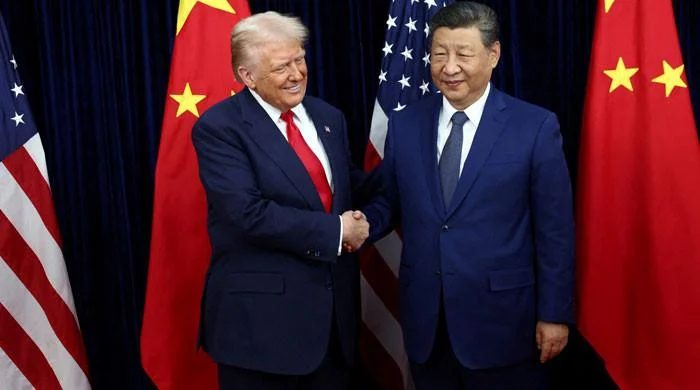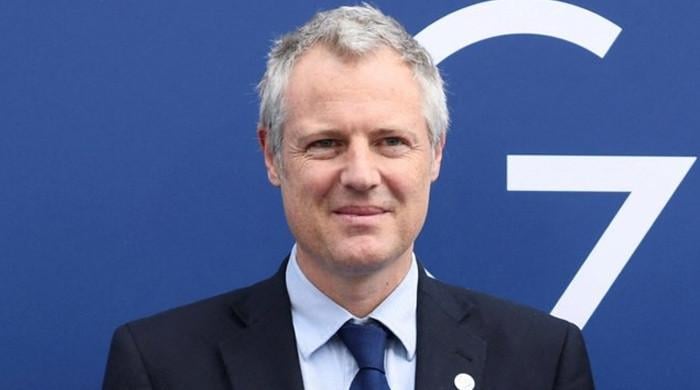- Both sides escalated trade threats to gain influence.
- The fentanyl issue is a key issue for Trump in the talks.
- Tensions with Taiwan loom over discussions between the United States and China.
US President Donald Trump began a meeting with China's leader Xi Jinping at a South Korean air base on Thursday, optimistic about the possibility of achieving a truce in the trade war between the world's two largest economies.
The talks in the southern port city of Busan, their first face-to-face meeting since 2019, mark the end of Trump's whirlwind tour of Asia in which he has touted various trade developments with South Korea, Japan and Southeast Asian nations.
“I have no doubt that we are going to have a very successful meeting. But he is a very tough negotiator,” Trump said as he shook hands with Xi, who showed little emotion when Trump told reporters that the two could sign a trade deal on Thursday.
As they sat down with their delegations to begin talks, Xi told Trump through a translator that it was normal for the world's two major economies to have friction from time to time.
A few days ago, trade negotiators from both countries reached a “fundamental consensus to address each other's major concerns,” Xi said. “I am willing to continue working with President Trump to lay a solid foundation for China-US relations,” he added.
China's currency, the yuan, rose to a nearly one-year high against the dollar as investors hoped for an easing of trade tensions that have shaken global business. Global stock markets, from Wall Street to Tokyo, have hit record highs in recent days.
Trump has repeatedly raised the possibility of a deal in his meeting with Xi, which took place on the sidelines of the Asia-Pacific Economic Cooperation (APEC) summit, since negotiators from both sides appeared to reach an understanding in Kuala Lumpur on Sunday.
But with both countries increasingly willing to play hardball in areas of economic and geopolitical competition – what analysts see as a new Cold War – many questions remain about how long any trade detente can last.
The trade war was reignited this month after Beijing proposed dramatically expanding restrictions on exports of rare earth minerals vital for high-tech applications, a sector China dominates.
Trump promised to retaliate with additional 100% tariffs on Chinese exports and other measures, including possible restrictions on exports to China made with US software, measures that could have disrupted the global economy.
“G2 WILL MEET SOON,” Trump posted on Truth Social shortly before landing in Busan to meet Xi at a South Korean air force base at Gimhae airport.
In a separate post, he said the United States would step up nuclear weapons testing immediately, highlighting China's growing arsenal.
US hopes Beijing will delay rare earth controls
After a weekend fight between top trade negotiators, U.S. Treasury Secretary Scott Bessent said he expected Beijing to delay rare earth controls for a year and revive purchases of U.S. soybeans, critical for American farmers, as part of a “substantial framework” to be agreed upon by leaders.
Ahead of the summit, China bought its first shipments of American soybeans in several months, Reuters reported exclusively on Wednesday.
The White House has indicated that it expects the summit to be the first of several between Trump and Xi next year, including possible visits by the leaders to each country, signaling a prolonged negotiation process.
But Trump wants some quick progress in talks that companies around the world are watching closely.
Trump said Wednesday that he hopes to reduce U.S. tariffs on Chinese goods in exchange for Beijing's commitment to stem the flow of precursor chemicals to make fentanyl, a deadly synthetic opioid that is the leading cause of overdose deaths in the United States.
Trump has also said he could sign a final deal with Xi over TikTok, the social media app that faces a ban in the United States unless its Chinese owners divest their U.S. operations.
Beijing is willing to work together to obtain “positive results,” Foreign Ministry spokesman Guo Jiakun said on Wednesday.
Previous agreements on tariffs and rare earths will expire
The previous agreements, which slashed retaliatory tariffs to about 55% on the U.S. side and 10% on the Chinese side and restarted the flow of rare earth magnets from China, are set to expire on Nov. 10.
Bessent said China had agreed to help stem the flow of fentanyl precursors, but did not say whether the United States had made any concessions in return.
Beijing has sought the lifting of 20% tariffs on fentanyl, an easing of export controls on sensitive US technology and a reduction of new US port fees on Chinese ships with the aim of combating China's global dominance in shipbuilding, shipping and logistics.
Trump's meeting with Xi comes at the end of a five-day trip to Asia in which he signed pacts with Japan and Southeast Asian nations on rare earths, seeking to mitigate China's stranglehold on minerals used in everything from cars to fighter jets.
Tensions over Taiwan
Regional strategic tensions, particularly over Taiwan, claimed by Beijing, a US partner and high-tech power, are an ominous backdrop for the summit.
On Sunday, Chinese state media said Chinese H-6K bombers recently flew near Taiwan to practice “confrontation drills.”
US Secretary of State Marco Rubio said Taiwan should not worry about talks between the US and China, even though some experts expressed fears that Trump could offer concessions on the island. US law requires Washington to provide Taiwan with the means to defend itself.












